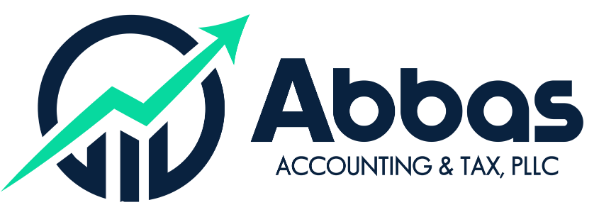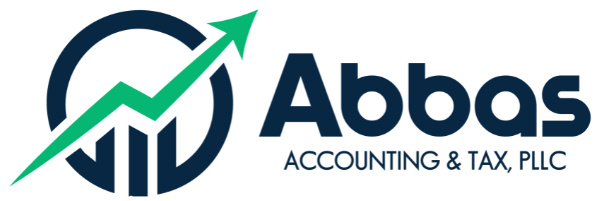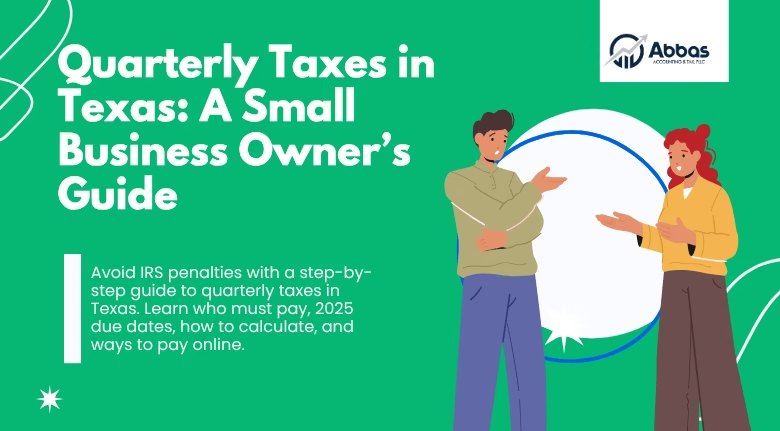Quarterly Taxes in Texas: A Small Business Owner’s Guide
If you’re a freelancer, contractor, or small business owner in Texas, understanding quarterly tax payments is essential. Unlike W-2 employees, self-employed individuals and LLC owners must pay estimated taxes during the year—or risk penalties. This guide covers who must pay, 2025 due dates, how to calculate, and how to file without stress.
Keep your estimates accurate with our Bookkeeping Services.
In This Guide
- Who Needs to Pay Quarterly Taxes?
- Texas Has No State Income Tax—But You Still Owe Federal
- Quarterly Tax Due Dates (2025)
- How to Calculate Your Quarterly Payments
- How to Pay Quarterly Taxes
- What Happens If You Don’t Pay?
- Common Mistakes to Avoid
- Quarterly Tax FAQ
- How Abbas CPA Supports You
- Final Thoughts
- Book a Tax Strategy Session
Who Needs to Pay Quarterly Taxes?
According to the IRS, you should pay estimated taxes if you:
- Expect to owe $1,000 or more in federal income tax after deductions and credits.
- Are self-employed, own a pass-through entity (LLC, S-Corp, partnership), or earn non-W-2 income.
- Have untaxed income from freelance work, rentals, investments, or side gigs.
This applies to:
- Freelancers & consultants
- LLC members & S-Corp owners
- Real estate investors
- Gig workers (Uber, DoorDash, Etsy sellers)
- Medical and legal professionals
(LSI: estimated taxes, self-employment tax, IRS Form 1040-ES, quarterly tax rules for business owners)
Texas Has No State Income Tax, But You Still Owe Federal
Texas doesn’t charge state personal income tax. However, you still owe federal income tax, self-employment tax (Social Security + Medicare = 15.3%), and federal quarterly estimated payments. If you run S-Corp payroll, you may also owe withholding and payroll taxes.
Quarterly Tax Due Dates (2025 Calendar)
| Quarter | Income Period | Payment Due Date |
|---|---|---|
| Q1 | Jan 1 – Mar 31 | April 15, 2025 |
| Q2 | Apr 1 – May 31 | June 17, 2025 |
| Q3 | Jun 1 – Aug 31 | Sept 16, 2025 |
| Q4 | Sep 1 – Dec 31 | Jan 15, 2026 |
Need help staying compliant? Explore our Tax Preparation Services.
How to Calculate Your Quarterly Tax Payments
3 Simple Methods
- Safe Harbor Method (Most Common): Pay 100% of last year’s total tax, or 110% if AGI > $150,000.
- Actual Income Estimate: Estimate current-year income, subtract deductions, apply IRS brackets. See Form 1040-ES instructions.
- CPA-Reviewed Estimate (Recommended): Let your CPA update payments quarterly based on fresh books.
Don’t Forget These Key Tax Elements
- Self-employment tax (15.3%) on net business income.
- Your income tax bracket (10–37%).
- Additional Medicare Tax if income exceeds $200K (single).
- Qualified Business Income (QBI) deduction if applicable.
To keep estimates accurate year-round, maintain clean books with our Bookkeeping Services and deeper planning via Small Business Accounting.
How to Pay Quarterly Taxes
Online Methods
- IRS Direct Pay — no account required.
- EFTPS (Electronic Federal Tax Payment System) — best for businesses.
- Paper check or money order with Form 1040-ES voucher.
Software + Automation Tools
- QuickBooks Self-Employed
- Gusto (for S-Corp payroll)
- Tax planner tools from your CPA
Let Abbas CPA automate your payments and avoid surprises — talk to us.
What Happens If You Don’t Pay Estimated Taxes?
- Underpayment penalties based on how much and how late.
- Interest on unpaid amounts.
- Late-filing fees if you also miss return deadlines.
According to the IRS, over 10 million taxpayers paid an underpayment penalty in 2023. Even if your income is irregular, pay something each quarter—the IRS prefers steady estimated payments.
Common Mistakes to Avoid
- Waiting until year-end to pay taxes.
- Not tracking income and deductions monthly.
- Using a personal account for business expenses.
- Assuming “no Texas income tax” means “no taxes at all.”
- Missing quarterly deadlines and hoping to catch up in April.
Need entity or payroll setup? We can help.
Quarterly Tax FAQ for Texas Businesses
Do LLCs pay quarterly taxes in Texas?
Yes—if taxed as a sole proprietorship or partnership, you’re responsible for your share of estimated federal taxes.
Do S-Corps pay quarterly taxes?
S-Corp owners pay via salary withholdings and may also make estimated payments on distributions or other income.
Can I avoid quarterlies by paying at year-end?
No. The IRS requires in-year payments; waiting can trigger penalties.
Can I adjust quarterly payments if my income changes?
Yes. With solid bookkeeping and a CPA, you can modify each quarter’s payment based on updated profits.
Prefer done-for-you quarterlies? Explore our Tax Preparation Services or Bookkeeping Services.
How Abbas CPA Supports You
- Calculate accurate quarterly payments.
- Track deductions and categorize expenses.
- File IRS forms (1040-ES, 941, 1120-S, etc.).
- Automate payment schedules.
- Keep you compliant year-round with CPA oversight.
Final Thoughts – Stay Ahead of the IRS with Smart Planning
- Break your bill into four manageable payments.
- Track income and expenses monthly.
- Avoid penalties and interest.
- Work with a Houston CPA who understands your business.
Ready to Simplify Quarterly Taxes?
Schedule a free consultation with Abbas CPA—let’s plan your payments and stop surprises.
Schedule a free consultation with Abbas Accounting & Tax PLLC
Related Posts

Understanding Small Business Tax Deductions
Explore top deductions including home office, depreciation, and retirement plans for 2025.
Read More
Quarterly Bookkeeping Tips for Texas Businesses
Learn how to stay compliant and audit-ready each quarter with these proven bookkeeping tips.
Read More
EXCELLENTTrustindex verifies that the original source of the review is Google. Haider is an exceptional accountant. His CPA background and exceptional knowledge of the US tax code has been a great asset to my businesses. His work is very clean and thorough, while always making an effort to communicate with me each step of the way. I would highly recommend him for anyone looking to grow their business!Trustindex verifies that the original source of the review is Google. My husband and I can not tell you how grateful we are for Abbas Accounting & Tax. Haider is so helpful and very very knowledgeable. So many of our neighbors recommended him and we are glad we reached out. We now feel confident and actually have an understanding on how we SHOULD fill out our W4 and our taxes. We finally have a trusted tax & accounting expert that we will continue to utilize every year! Thank you!Trustindex verifies that the original source of the review is Google. I had an excellent experience with Abbas Accounting & Tax in Richmond. Their team is professional, knowledgeable, and genuinely cares about helping their clients. Haider Abbas made the process simple and stress-free, providing clear explanations every step of the way. Their expertise saved me both time and money on my taxes. I highly recommend Abbas Accounting & Tax to anyone seeking reliable, trustworthy, and friendly accounting services.Trustindex verifies that the original source of the review is Google. Haider has been incredibly helpful in guiding me through my tax filing process and helping me understand the advantages available to me. He took the time to explain everything clearly, making sure I was informed and confident in my decisions. Beyond just taxes, Haider also provided valuable insights into forming my LLC, helping me structure it in a way that benefits me both financially and legally. His expertise, professionalism, and willingness to go the extra mile truly set him apart.Trustindex verifies that the original source of the review is Google. I've known Haider Abbas for many years, and I can confidently say he is one of the most knowledgeable and trustworthy CPAs out there. He genuinely cares about his clients and takes the time to explain everything in a way that makes sense. Whether it’s tax preparation, accounting, or financial advice, he goes above and beyond to ensure accuracy and maximize savings. His professionalism, attention to detail, and commitment to client success truly set him apart. If you're looking for a reliable CPA who will always have your best interests in mind, especially when tax season is upon us, I highly recommend Abbas Accounting & Tax!Trustindex verifies that the original source of the review is Google. He’s done our taxes for over ten years and has saved us so much money every year. Haider has great knowledge and expertise with the ability to communicate effectively and adapt to our needs. It has been a pleasure working with him for over a decade! Highly recommend.Trustindex verifies that the original source of the review is Google. Best place to get your taxes done. Haider has great knowledge & expertise to handle your business or personal taxes.Trustindex verifies that the original source of the review is Google. Great service. Haider Abbas explains taxes in a simple manner and helps to make sure you are getting your full refund, by knowing the tax laws so well. Would highly recommend to everyone!Verified by TrustindexTrustindex verified badge is the Universal Symbol of Trust. Only the greatest companies can get the verified badge who has a review score above 4.5, based on customer reviews over the past 12 months. Read more


